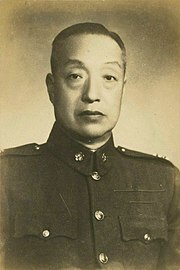You can help expand this article with text translated from the corresponding article in Chinese. (May 2023) Click [show] for important translation instructions.
|
General Xu Yongchang (15 December 1885 – 12 July 1959) (Hsu Yung-chang; Chinese: 徐永昌; pinyin: Xú Yǒngchāng; Wade–Giles: Hsu2 Yung3-ch'ang1; style name: Cichen (Tzu-chen)) was the Minister of Board of Military Operations of the Republic of China between December 22, 1948, and April 22, 1949, and the representative of the Republic of China on September 2, 1945, at the signing of the Instrument of Surrender of Japan that ended World War II.
Xu Yongchang | |
|---|---|
 | |
| Native name | 徐永昌 |
| Born | December 15, 1885 Yuanping, Shanxi, Qing dynasty |
| Died | 12 July 1959 (aged 73) Taipei, Taiwan |
| Allegiance | |
| Service/ | |
| Years of service | 1909–1959 |
| Rank | General |
| Unit | Shanxi clique |
| Commands held | First War Zone |
| Battles/wars | |
| Awards | Order of Blue Sky and White Sun |
| Other work | government advisor |
Xu Yongchang graduated from the Beijing Military Institute and later became the General Commander of the 3rd Army under Feng Yuxiang and the 20th Route Jin Army under Yan Xishan. He was the Chairman of Shanxi province at the time of Mukden Incident, and served in the National Revolutionary Army as the Chief Operations Supreme Staff.

After the Second Sino-Japanese War, he was the president of the Beijing Military Institute and the Minister of Defence. He represented China at the Japanese Instrument of Surrender. He went to Taiwan after the Chinese Civil War, served as a senior advisor to the Office of the President and a member of Central Review Committee, and died in 1959.
Xu Yongchang's diary was published by the Academia Sinica's Institute of Modern History in 1989.